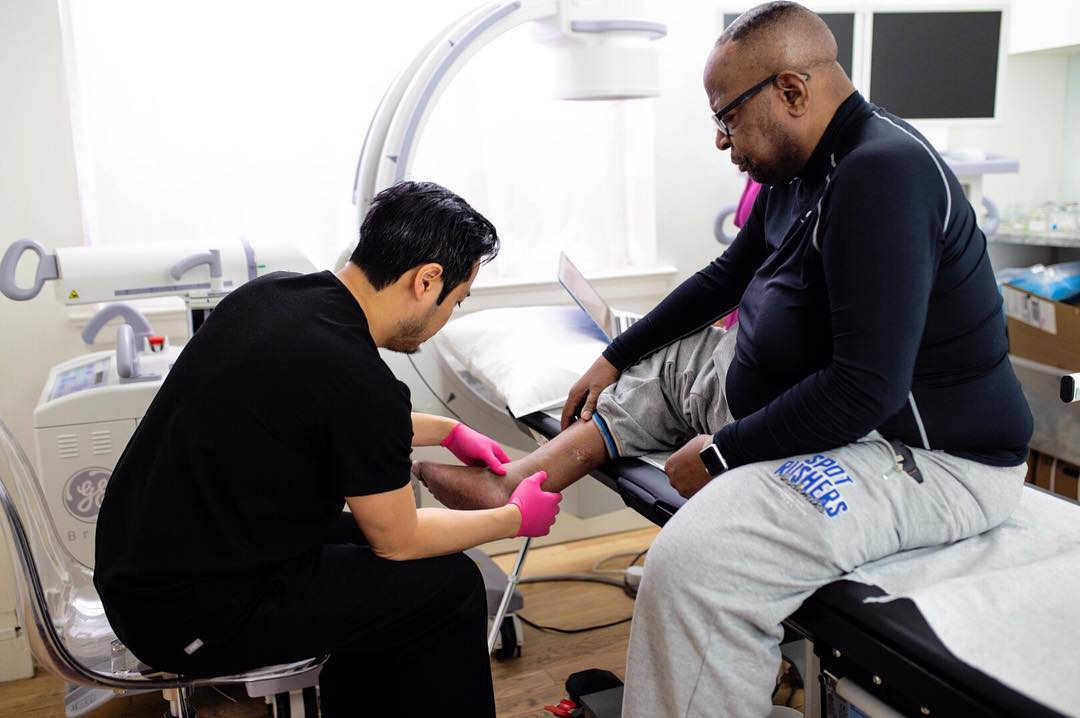Causes of Swelling in Legs and Feet
Swelling in legs and feet isn’t usually a cause for concern, especially if it occurs because of surface wounds or because you’ve been sitting or standing for long stretches of time. However, if swelling in feet is accompanied by extreme pain, numbness, tingling, redness, itching, or shortness of breath, it may be a symptom of an underlying disease.
If you experience any of these additional symptoms, contact a reputable physician and get tested for an underlying condition immediately. The following are some of the potential causes of swelling in legs and feet.

Chronic Venous Insufficiency
Chronic venous insufficiency is a condition in which the valves in the veins malfunction. These valves are usually responsible for facilitating blood circulation to the heart. As such, when they malfunction, blood flows back down and pools in the legs and ankles. This leads to swelling in legs and feet.
If left untreated, chronic venous insufficiency can have some terrible consequences like the development of varicose veins, profuse bleeding, skin infections, leg ulcers, and even a potentially fatal condition called deep vein thrombosis.
At VIP Medical Group, our world-renowned vein doctors can study all of your symptoms and run tests to determine if the swelling in legs and feet is caused by vein disease. If so, we treat vein disease with advanced minimally-invasive treatments such as sclerotherapy, Radiofrequency Ablation, VenaSeal, or Endovenous Laser Ablation. All of these treatments are completely safe, carry negligible risk of side effects, and lead to no recovery downtime.
Deep Vein Thrombosis
As previously mentioned, venous insufficiency can lead to deep vein thrombosis. This is a medical condition in which the accumulated blood in your veins clots, which leads to stiffness and swelling in legs. If not treated in time, the blood clots may also travel to the lungs and lead to a potentially fatal condition called pulmonary embolism.
If you have deep vein thrombosis, consult your nearest vein specialist in NY or vein specialist in NJ immediately.
Sciatica
Sciatica is a back problem that occurs due to an injury in the sciatic nerve, which runs from the lower back down each leg. When this nerve is injured, the pain shoots through your back and spreads all the way down to your legs, resulting in swollen ankles.
Cirrhosis
Cirrhosis is a liver disease caused by excessive alcohol consumption. This condition can affect blood circulation and cause swelling in legs and feet.
Infections and Injuries
If you injure your legs, blood flow increases in the affected region. The accumulated blood leads to swelling in legs.
Pеrісаrdіtіѕ
The pericardium is a sac-like membrane surrounding the heart. If this membrane gets infected, it can lead to swelling in hands and feet.
Pregnancy
Feet swelling in pregnancy is pretty common because of the constantly fluctuating hormonal changes that reduce or increase blood circulation in the legs. However, excessive feet swelling in pregnancy may also be a sign of preeclampsia, which is a serious condition that you need to consult a doctor for.
Lуmрhеdеmа
Lymph is a protein-rich fluid that usually moves through vessels and capillaries and is filtered through the lymph nodes. If the lymph nodes or vessels are removed or get blocked, the lymphatic fluid accumulates, leading to swollen legs and feet.
Kidney Disease
Kidney disease can lead to fluid buildup in the body, which can lead to swelling in legs and feet.
Medications
Swelling in legs and feet is a common side-effect of several different types of medicines and drugs:
- Hormones such as estrogen and testosterone found in contraceptives or hormone replacement therapy.
- Blood pressure medicines such as nifedipine, amlodipine, diltiazem, felodipine, and verapamil.
- Diabetes medications.
How to Reduce Swelling in Feet?
You may be wondering how to reduce swelling in feet through natural means or home remedies. The following are some tips you can follow to reduce swelling in feet:
- Wear loose-fitting clothes that don’t restrict blood flow.
- Exercise often to encourage blood circulation.
- Wear compression stockings to push blood along and prevent accumulation.
- Stretch often and don’t sit or stand still for too long at a single stretch.
- Keep your legs elevated.
- Don’t eat food with high salt as it leads to fluid buildup.
Please note that these tips and home remedies will only work if your swelling isn’t caused by a larger underlying issue. If your swelling in feet is caused by one of the aforementioned conditions, you will have to consult a physician for the relevant treatment.
Treating the Root Cause of Swelling in Feet
At VIP Medical Group, our board-certified Ivy League-educated doctors take the time to study your condition and explore the root cause of swelling in feet. They run a series of tests — including a Doppler ultrasound — to determine if the swelling is caused by underlying vein disease.
If the swelling is caused by venous insufficiency, we use non-surgical minimally-invasive treatments to not just reduce swelling in legs and feet but also treat the underlying disease. This ensures that the disease doesn’t progress further and the swelling won’t return, at least not for the same reason.
Even though swelling in legs and feet may seem temporary or harmless, they can be dangerous if left undiagnosed. If the swelling is persistent and accompanied by additional symptoms, please schedule an appointment with your nearest vein treatment clinic immediately.

